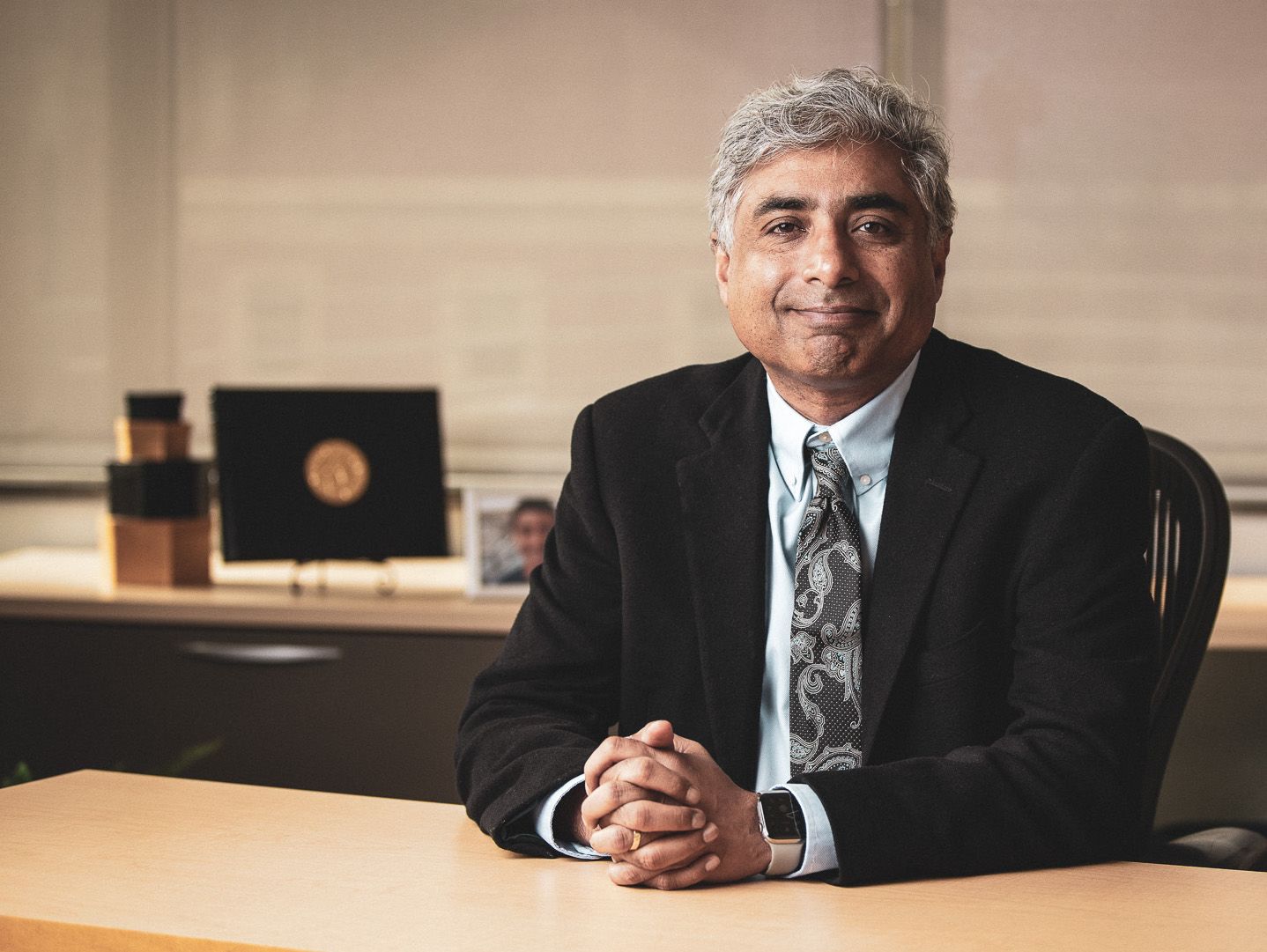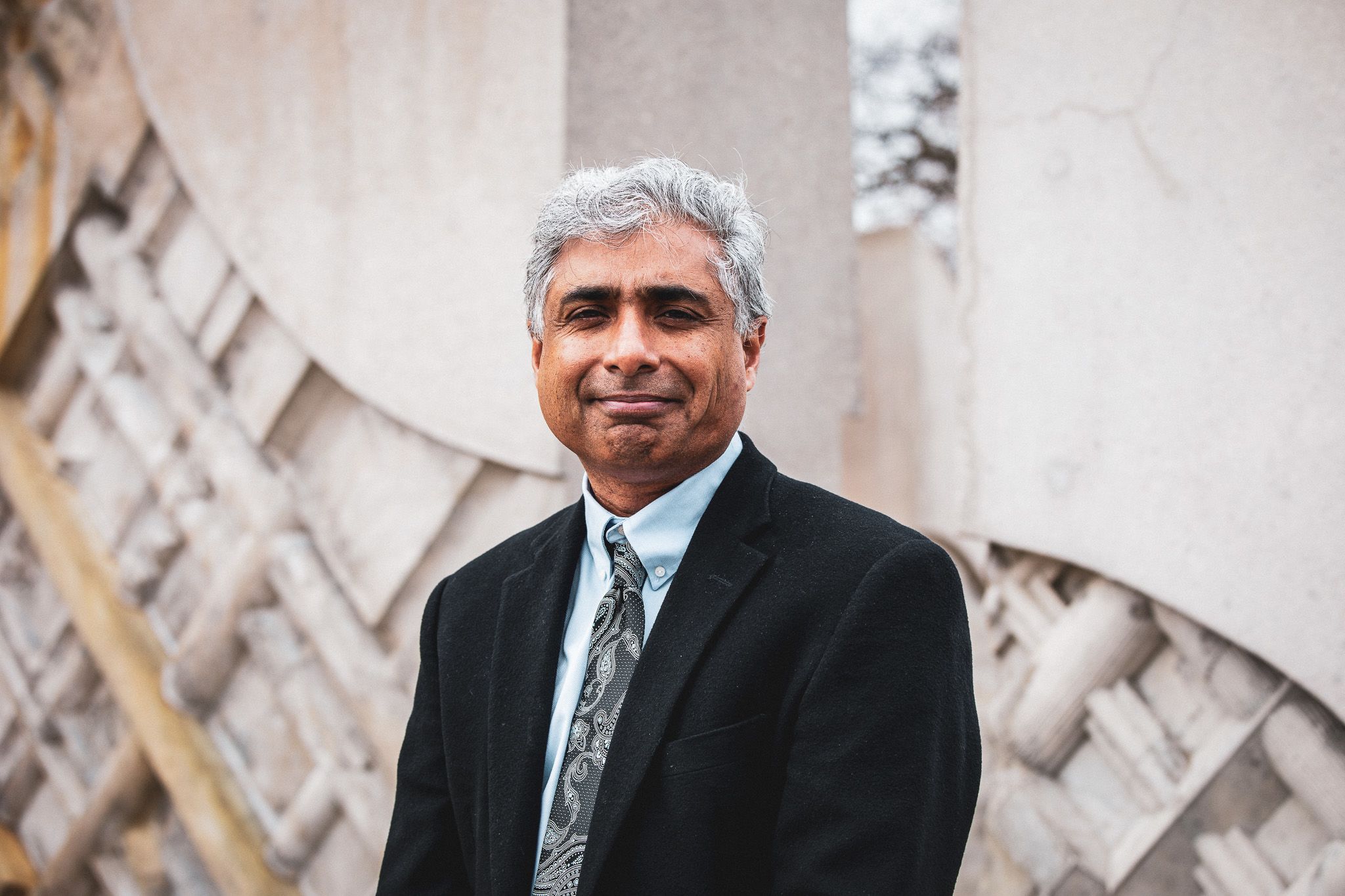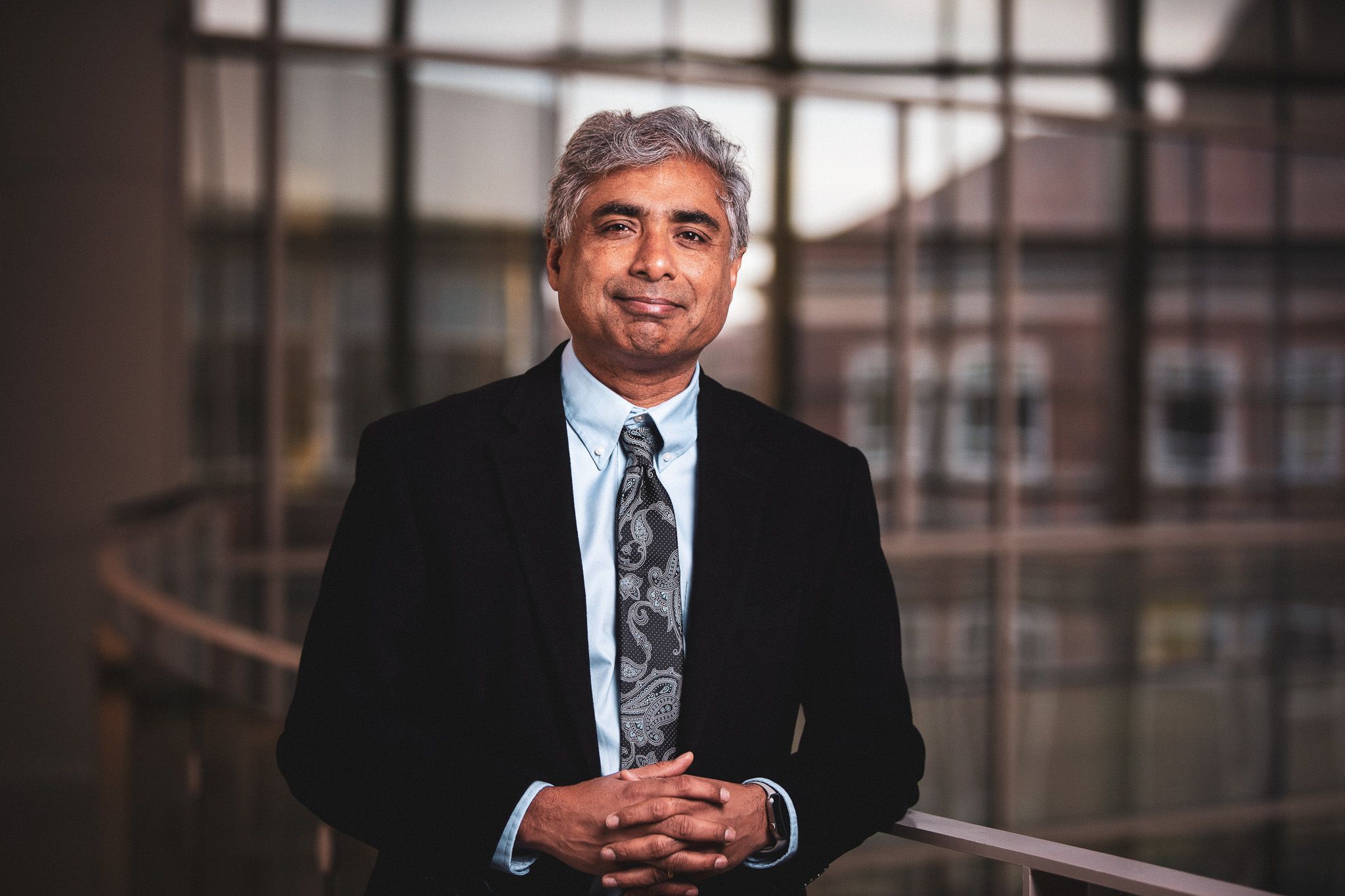ONCE-IN-A-GENERATION OPPORTUNITY

This was not the intended career trajectory.
When Arvind Raman (MS ME’94) made the decision to pursue academia in the late 1990s, he was happy being “in the trenches.”
He enjoyed teaching, research, and interacting with talented students, and he chose to join the faculty at Purdue University’s College of Engineering because he knew it was the ideal place to excel in all three. He would be given resources and support to succeed, be encouraged to innovate, and be surrounded by the world’s brightest undergraduate and graduate students.
And then came an opportunity to move into an administrative role in Purdue Engineering in 2014—and another and another.
It was “not at all” what Raman was expecting for his life in academia.
But it wasn’t by chance that he kept advancing, not with the leadership skills he’d developed in nearly 20 years at the college; not with the passion to pave the way for others to succeed; not with the insistence on maximizing the potential and impact for everyone within Purdue Engineering.
In February 2023, the self-proclaimed “accidental administrator” was named the John A. Edwardson Dean of the College of Engineering.
“It’s a once-in-a-generation opportunity,” Raman says. “Look at the challenges ahead of us; look at the talents of our people; look at the resources coming down. That’s why I’m excited.”
Raman’s optimism stems from the extraordinary pool of students, world-class faculty, and increasing focus on engineering’s vital role in solving global challenges. The recent surge in federal investments—spanning national security, the Build Back Better program, and the CHIPS and Science Act—further reinforces the centrality of engineering in shaping the future.
“If you look at these last few years, one might think things are gloomy. But the moments that have uplifted us in the last few years have been engineering marvels. They have made us reflect on how fundamental engineering is to the future of peace, prosperity, health, joy of living, and planet.”
The Early Years
Raman’s upbringing in northern India as the son of college-educated immigrants instilled in him a strong work ethic and an ability to adapt to diverse cultures and environments. His mother, a “really, really brilliant” chemistry teacher, played a pivotal role in shaping his interest in STEM fields, ultimately leading him to pursue a career in engineering.
Curiosity at his core, Raman was the kid who was as enamored with other students’ projects as his own—asking questions and studying topics that piqued his interest.
By the time Raman had completed his bachelor’s degree in mechanical engineering from the India Institute of Technology in Delhi in 1991, he was ready to test industry waters. An internship at a local Maruti Suzuki plant was “a blast”—so much so that he worked two shifts that summer, in part to take advantage of the free meals interns were provided, he jokes. But it also revealed his desire to be challenged. Graduate school, and its lure of research, was calling.
Choosing Purdue University for its renowned academic rigor and research reputation, Raman faced financial challenges upon arrival in the United States. With just $600 and one suitcase, he took out a loan to sustain himself until his first research assistant paycheck arrived. His resourcefulness and unwavering commitment to learning characterized his early years at Purdue.
Raman’s innate inquisitiveness blossomed during his PhD work at the University of California, Berkeley, and postdoctoral research in Germany. It deepened when he pursued academia as a career path, accepting an offer to come back to Purdue and join Mechanical Engineering as an assistant professor in 2000.

This was not the intended career trajectory.
When Arvind Raman (MS ME’94) made the decision to pursue academia in the late 1990s, he was happy being “in the trenches.”
He enjoyed teaching, research, and interacting with talented students, and he chose to join the faculty at Purdue University’s College of Engineering because he knew it was the ideal place to excel in all three. He would be given resources and support to succeed, be encouraged to innovate, and be surrounded by the world’s brightest undergraduate and graduate students.
And then came an opportunity to move into an administrative role in Purdue Engineering in 2014—and another and another.

It was “not at all” what Raman was expecting for his life in academia.
But it wasn’t by chance that he kept advancing, not with the leadership skills he’d developed in nearly 20 years at the college; not with the passion to pave the way for others to succeed; not with the insistence on maximizing the potential and impact for everyone within Purdue Engineering.
In February 2023, the self-proclaimed “accidental administrator” was named the John A. Edwardson Dean of the College of Engineering.
“It’s a once-in-a-generation opportunity,” Raman says. “Look at the challenges ahead of us; look at the talents of our people; look at the resources coming down. That’s why I’m excited.”
Raman’s optimism stems from the extraordinary pool of students, world-class faculty, and increasing focus on engineering’s vital role in solving global challenges. The recent surge in federal investments—spanning national security, the Build Back Better program, and the CHIPS and Science Act—further reinforces the centrality of engineering in shaping the future.
“If you look at these last few years, one might think things are gloomy. But the moments that have uplifted us in the last few years have been engineering marvels. They have made us reflect on how fundamental engineering is to the future of peace, prosperity, health, joy of living, and planet.”
The Early Years
Raman’s upbringing in northern India as the son of college-educated immigrants instilled in him a strong work ethic and an ability to adapt to diverse cultures and environments. His mother, a “really, really brilliant” chemistry teacher, played a pivotal role in shaping his interest in STEM fields, ultimately leading him to pursue a career in engineering.
Curiosity at his core, Raman was the kid who was as enamored with other students’ projects as his own—asking questions and studying topics that piqued his interest.
By the time Raman had completed his bachelor’s degree in mechanical engineering from the India Institute of Technology in Delhi in 1991, he was ready to test industry waters. An internship at a local Maruti Suzuki plant was “a blast”—so much so that he worked two shifts that summer, in part to take advantage of the free meals interns were provided, he jokes. But it also revealed his desire to be challenged. Graduate school, and its lure of research, was calling.
Choosing Purdue University for its renowned academic rigor and research reputation, Raman faced financial challenges upon arrival in the United States. With just $600 and one suitcase, he took out a loan to sustain himself until his first research assistant paycheck arrived. His resourcefulness and unwavering commitment to learning characterized his early years at Purdue.
Raman’s innate inquisitiveness blossomed during his PhD work at the University of California, Berkeley, and postdoctoral research in Germany. It deepened when he pursued academia as a career path, accepting an offer to come back to Purdue and join Mechanical Engineering as an assistant professor in 2000.
Purdue Path
Raman had measurable success from the beginning, receiving teaching awards and prestigious research grants and earning recognition for his outstanding contributions to the field. His passion for teaching, research, and collaboration with colleagues from various disciplines has been a driving force in his career.
“I have this natural interest in just any part of engineering or science or university,” he says. “I’ll spend time to understand what people are doing. I think Purdue offers a fantastic opportunity, certainly within engineering, for people to stretch out, to collaborate extensively, and to move into new arenas.”
Throughout his tenure, Raman has consistently sought opportunities to pave the way for others’ success. This commitment led him to various administrative roles within the College of Engineering, where he played a pivotal role in enhancing faculty and staff programs, promoting diversity, and elevating the college’s prestige.
Future for Purdue Engineering
As the dean of the College of Engineering, Raman’s plans extend beyond academic excellence. He envisions Purdue Engineering becoming the most consequential engineering college in the nation by 2030.
“Consequentiality is a word that speaks to the extent to which we’d have a positive impact on society. It really resonates with engineering because engineering, at its heart, is creating solutions for people in society. It’s about adding value significantly.”
For Raman, it’s not just about thinking of impact; it’s about maximizing impact on education, research, and economic development. As he guides Purdue Engineering into the future, his focus remains on ensuring that the college continues to be a source of innovation and positive change.
It’s not just how students are educated, though. The who is being educated is essential to the equation, Raman says. He wants to increase the number of women, first-generation college students, and underrepresented minorities within the college.
“The reason we’re all here—the reason for existence, the reason for what we do—is students. The energy you derive comes from students. There’s absolutely no doubt about it. It’s at the heart of what we do.”
This is a condensed version of a longer story by the College of Engineering.


Purdue Path
Raman had measurable success from the beginning, receiving teaching awards and prestigious research grants and earning recognition for his outstanding contributions to the field. His passion for teaching, research, and collaboration with colleagues from various disciplines has been a driving force in his career.
“I have this natural interest in just any part of engineering or science or university,” he says. “I’ll spend time to understand what people are doing. I think Purdue offers a fantastic opportunity, certainly within engineering, for people to stretch out, to collaborate extensively, and to move into new arenas.”
Throughout his tenure, Raman has consistently sought opportunities to pave the way for others’ success. This commitment led him to various administrative roles within the College of Engineering, where he played a pivotal role in enhancing faculty and staff programs, promoting diversity, and elevating the college’s prestige.
Future for Purdue Engineering
As the dean of the College of Engineering, Raman’s plans extend beyond academic excellence. He envisions Purdue Engineering becoming the most consequential engineering college in the nation by 2030.
“Consequentiality is a word that speaks to the extent to which we’d have a positive impact on society. It really resonates with engineering because engineering, at its heart, is creating solutions for people in society. It’s about adding value significantly.”
For Raman, it’s not just about thinking of impact; it’s about maximizing impact on education, research, and economic development. As he guides Purdue Engineering into the future, his focus remains on ensuring that the college continues to be a source of innovation and positive change.
It’s not just how students are educated, though. The who is being educated is essential to the equation, Raman says. He wants to increase the number of women, first-generation college students, and underrepresented minorities within the college.
“The reason we’re all here—the reason for existence, the reason for what we do—is students. The energy you derive comes from students. There’s absolutely no doubt about it. It’s at the heart of what we do.”
This is a condensed version of a longer story by the College of Engineering.
SUPPORT THE FUTURE OF ENGINEERING!
Your gift can help Purdue Engineering become the most consequential engineering college in the nation.
Read more stories from this issue of Purdue Alumnus magazine.
